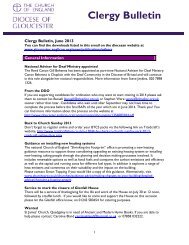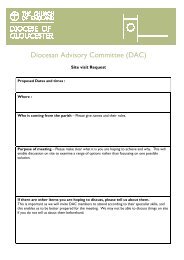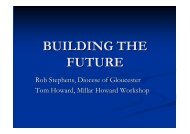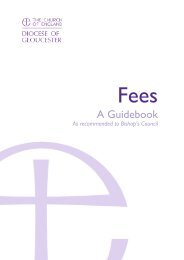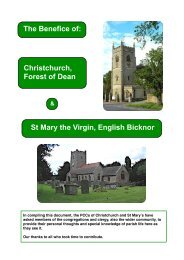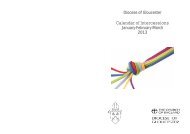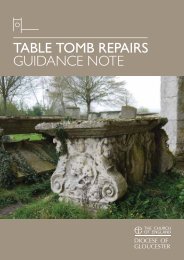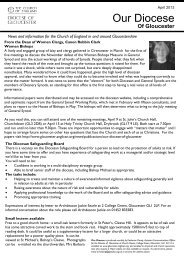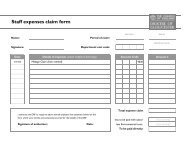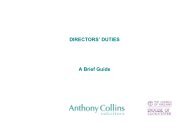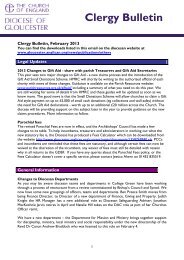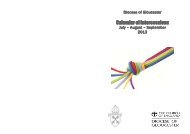Download the Revised RE Syllabus 2011 - Diocese of Gloucester
Download the Revised RE Syllabus 2011 - Diocese of Gloucester
Download the Revised RE Syllabus 2011 - Diocese of Gloucester
Create successful ePaper yourself
Turn your PDF publications into a flip-book with our unique Google optimized e-Paper software.
Religious Education in <strong>Gloucester</strong>shire - Agreed <strong>Syllabus</strong> <strong>2011</strong>-2016<br />
Planning process: Key Stage 3<br />
Devising your own questions<br />
Step 1<br />
Take <strong>the</strong>me and devise<br />
key question<br />
Step 2<br />
Select/devise learning<br />
outcomes<br />
Step 3<br />
Select specific content<br />
Step 4<br />
Assessment: write<br />
levelled pupil outcomes<br />
(“I can...”)<br />
Step 5<br />
Teaching and learning<br />
activities<br />
Take syllabus <strong>the</strong>me (see page 90), or<br />
explore school <strong>the</strong>me and see what<br />
genuine links <strong>the</strong>re are with <strong>RE</strong> <strong>the</strong>mes<br />
(page 90) and expectations (page 89).<br />
Use <strong>the</strong> “fields <strong>of</strong> enquiry” to make sure<br />
<strong>the</strong>re is a good <strong>RE</strong> focus for <strong>the</strong>se<br />
questions (see supplement page 22).<br />
Devise suitably open key question to<br />
explore <strong>the</strong>me through <strong>RE</strong>, with links to<br />
o<strong>the</strong>r subjects if required.<br />
Look at <strong>the</strong> learning outcomes for o<strong>the</strong>r<br />
key questions (“So that <strong>the</strong>y can...” pages<br />
94-109). Select some relevant outcomes,<br />
or use <strong>the</strong>se as models for your own <strong>RE</strong><br />
learning outcomes for your key question,<br />
as appropriate to <strong>the</strong> age and ability <strong>of</strong><br />
your pupils, balancing learning about and<br />
learning from religion and beliefs.<br />
Look at <strong>the</strong> content for KS3 questions<br />
(“Students will learn...” pages 94-109).<br />
Where <strong>the</strong>re are significant links, select<br />
relevant <strong>RE</strong> content to enable pupils to<br />
explore <strong>the</strong> key question. Select <strong>the</strong> best<br />
content to help you to deliver <strong>the</strong> learning<br />
outcomes in an engaging way.<br />
Turn <strong>the</strong> <strong>RE</strong> learning outcomes into pupilfriendly<br />
“I can” statements. Do this by<br />
using <strong>the</strong> levels <strong>of</strong> attainment (page 31)<br />
and work out just what it is that you want<br />
your pupils to be able to do as a result<br />
<strong>of</strong> <strong>the</strong>ir learning. Be clear about <strong>the</strong> skills<br />
<strong>the</strong>y will develop. This process allows<br />
assessment to be integrated throughout<br />
<strong>the</strong> teaching unit, so that <strong>the</strong>re is no need<br />
for an end <strong>of</strong> unit assessment activity.<br />
Use some engaging stimuli and<br />
imaginative activities to enable your<br />
pupils to achieve <strong>the</strong> levelled outcomes.<br />
21



